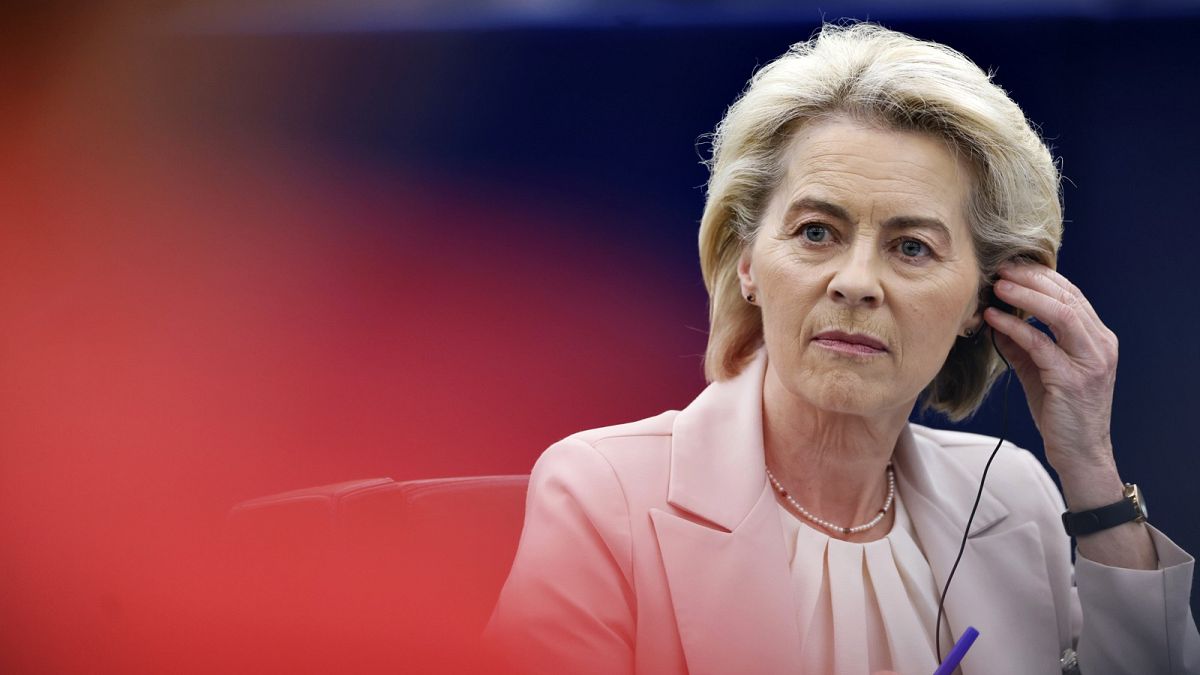The top contenders to preside over the European Commission are on Monday scheduled to face off against the incumbent – and frontrunner.
The debate will begin at 19:00 CET in Maastricht, the Netherlands, and mark the first time the lead candidates, or Spitzenkandidaten, confront each other's projects ahead of the elections to the European Parliament in early June.
Ursula von der Leyen is all but guaranteed to be the event's centre of attention, as aspirants to her right assail her Green Deal policies and aspirants to her left denounce her party's ever-closer alliance with hard- and far-right forces.
For a sitting president, a presidential-like debate will be something of a novelty: over the past five years, von der Leyen has firmly stuck to her above-the-fray platform as Commission chief to promote "European solutions" to "European challenges," which can be embraced by mainstream parties across the spectrum.
This has turned her into a pragmatic, ideologically flexible figure who has managed to deepen ties with both right-wing and left-wing leaders, from Greece's Kyriakos Mitsotakis to Spain's Pedro Sánchez, to advance her ambitious agenda, the vast majority of which has already reached the finish line.
As a result, von der Leyen has avoided resorting to the fractious, no-holds-barred style that traditionally defines partisan politics. In fact, MEPs have often complained about how the president exits plenary sessions halfway and leaves one of her Commissioners to field hot-button questions.
But with the campaign in full swing, she has no choice but to leave herself open.
On Friday, von der Leyen's electoral team, controversially headed by her chief of staff, who is on unpaid leave, unveiled the official slogan – "More than a Union. Our home" – and new pictures of the candidate under the words "Ursula 2024" between yellow stars.
The images were immediately plastered across all social media accounts of her party, the centre-right European People's Party (EPP). Notably, the team will not resort to TikTok, the Chinese-owned video-sharing app that has become a phenomenon among teenagers and a security headache among policymakers.
The iconography is an undisguised attempt to heavily personalise the campaign and put von der Leyen at the forefront of the EPP's efforts to remain the largest group in the Parliament, even if she is actually not running for a seat in the hemicycle.
Despite its dominant role in Brussels, which polls predict will be untouched, the EPP continues to struggle to lead one of the main member states. As of today, the largest country in the bloc governed by an EPP politician is Poland following last year's electoral victory of Donald Tusk. The so-called "Big Four" – Germany, France, Italy and Spain – are in the hands of competing parties.
The lack of high-voltage power has made von der Leyen the EPP's most recognisable face in the party, as the "Ursula 2024" campaign now reflects. The central standing, however, contrasts with the opposition that some of her flagship policies, including the gradual ban on the combustion engine, the Nature Restoration Law and a now-defunct proposal to slash the use of pesticides, have triggered among the EPP ranks.
Still, with no clear alternative in sight, the centre-right formation is betting big on von der Leyen for a second term that is expected to focus on competitiveness and defence, which tend to play well with the conservative electorate.
"Prosperity. Security. Democracy. This is what people care about in these difficult times. And this is what the EPP will stand for in this election," von der Leyen says in a quote included in the campaign's media kit.
The appointment of the European Commission president is first agreed upon by the European Council and later confirmed by the European Parliament, a tricky two-step process that requires contenders to switch from partisan agent to consensus builder.
Besides her strong relations with the capitals, which is essential for the European Council's endorsement, von der Leyen is also benefitting from the low to non-existent profile of her other competitors.
The most prominent aspirant in the race is Nicolas Schmit, the European Commissioner for Jobs and Social Rights, who represents the Party of European Socialists (PES). Schmit has so far avoided direct attacks against his current boss and instead honed in on the EPP's "normalisation" of far-right talking points.
The Maastricht debate, co-hosted by Politico Europe and Studio Europa, will also feature Marie-Agnes Strack-Zimmermann (Alliance of Liberals and Democrats for Europe Party), Bas Eickhout (European Green Party), Anders Vistisen (Identity and Democracy Party), Walter Baier (Party of the European Left), Maylis Roßberg (European Free Alliance) and Valeriu Ghilețchi (European Christian Political Movement) on stage.
Following the event, von der Leyen will resume her tour across member states, with the Czech Republic, Poland and Italy as the next destinations. Given the language barriers, her presence on the campaign trail is expected to serve as a supportive act to the national parties who are vying for seats in the Parliament.
